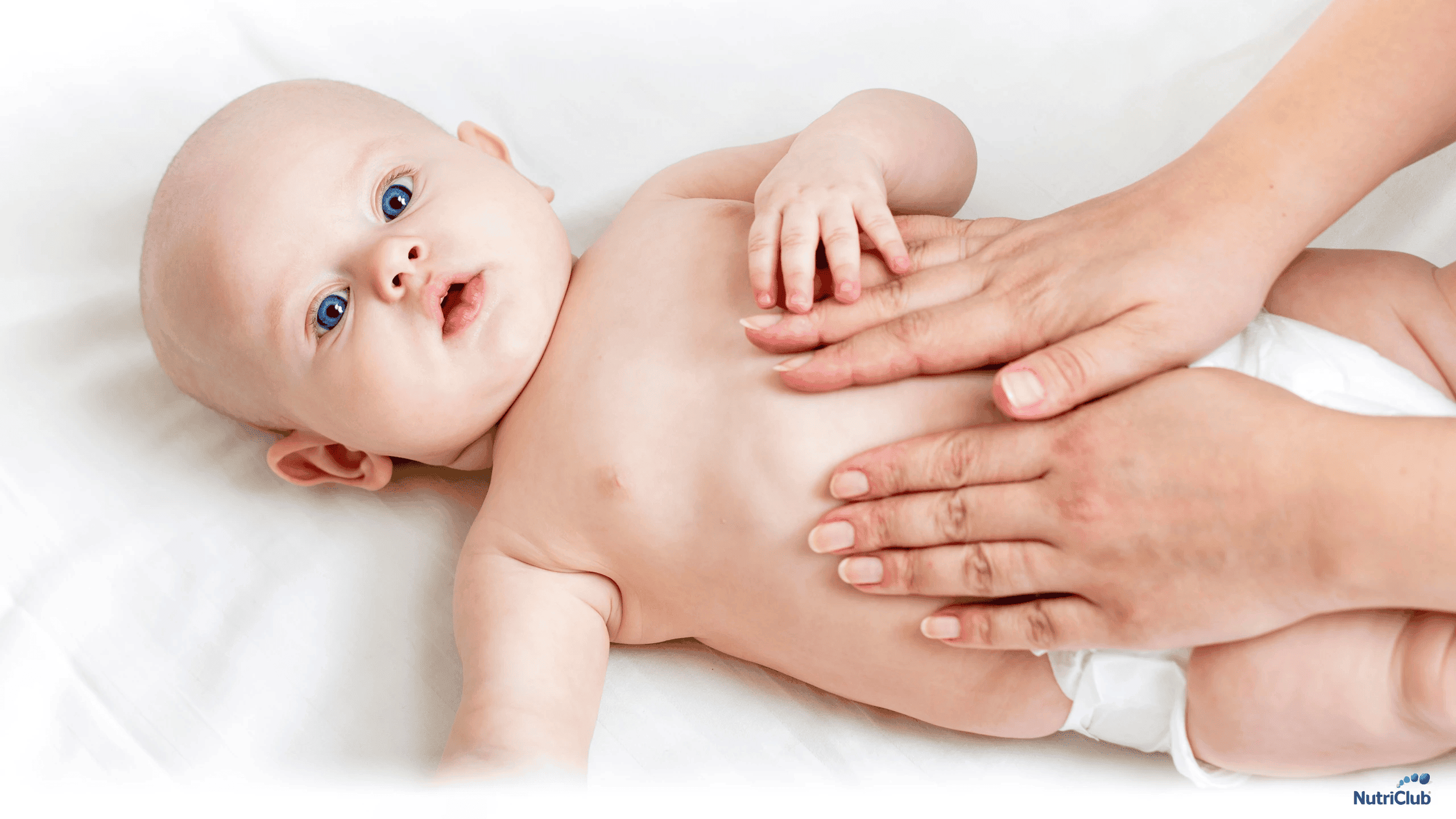Baby Constipation
Constipation in babies can be a challenge to deal with and can result in your baby experiencing some pain and discomfort. However, rest assured that baby constipation is relatively common, and there are several things that you can do to ease the symptoms.
Here we’re looking at what causes constipation in babies and what the symptoms are, as well as the treatment options and which foods can help to get things moving.

What causes constipation in babies?
There are a number of possible causes of constipation in babies, including1:
If your baby has been unwell and not eating or not getting enough fluids, they could be dehydrated. This lack of food and fluid intake could lead to them becoming constipated. A dry mouth and fewer wet nappies are a couple of things that may indicate your baby isn’t getting enough fluids.
A change in your baby’s diet. Remember that your baby’s digestive system is brand new, so adjusting to new foods takes time and practice.
Low fibre intake. If your baby is weaning, it’s important to make sure that they’re eating a varied diet including fruits, vegetables and cereals, all of which are great sources of fibre. Not doing so might lead to constipation.
Sometimes, constipation in weaning babies can be the result of food allergies2, and if you suspect that this might be the case, you should speak to your GP for further advice.
It’s also possible that there’s a psychological reason for your baby’s constipation. For example, if it hurts your baby to poo (perhaps because of a small tear in the anal canal, called a fissure), then they might stop themselves from going to avoid the pain. Following on from that, if babies get into the habit of withholding stools for any reason, then it can become a habit that they continue with.
Remember that most cases of baby constipation can be eased with some simple adjustments, and it’s all about discovering what works to help your baby.
Symptoms of constipation in babies
You’ll usually be able to recognise if your baby has constipation because of the following signs and symptoms3:
- Delayed or infrequent stools (less than three times per week).
- Baby poo that’s small, dry and hard.
- Your baby is in pain and has difficulty going to the toilet.
- Foul-smelling baby poo or wind.
- Excessive wind.
- Poor appetite.
- A lack of energy and lethargy.
- A firm tummy.
If your baby is showing any of the above symptoms, it’s a good idea to talk to your health visitor or GP. They’ll be able to provide you with guidance on how to manage baby constipation and advise you as to whether any treatment is required.
If your baby is irritable, crying and uncomfortable, this could also be a sign of colic, and you can learn more about that here.
Our Baby Symptom Checker is a useful tool to help you identify the signs of constipation in babies and can be used if your baby is less than a year old.
Constipation in breastfed babies
Can breastfed babies get constipated? The simple answer is yes. Whilst constipation is rare in babies who are solely breastfed4, it can still happen.
Remember that if you’re breastfeeding, your baby won’t need anything other than breastmilk, including water, until they've started eating solid foods, and it’s recommended that this doesn’t happen until your baby is around 6 months of age5.
Constipation in formula fed babies
Constipation tends to be more common in formula fed babies than in those who are breastfeeding exclusively. If you’ve recently started giving your baby formula milk and you notice a change in their bowel movements, it’s likely that their tummy is simply adapting to the change.
When you’re formula feeding your baby, it’s very important that you follow the instructions provided on your formula milk pack exactly. You should never reduce or increase the amount of powder you use, or add extra water to your baby’s bottle. This is because too little formula milk powder won’t provide the nourishment your baby needs, and too much can cause constipation6 or make your baby ill.
If your baby is formula feeding, and is experiencing constipation, you could try giving your baby cooled, boiled water in between their normal feeds3.
If symptoms persist and you need further advice, don’t hesitate to speak to your health visitor, pharmacist or GP about other nutritional solutions available to help manage your baby’s constipation.
Constipation in weaned babies
If your baby is a little bit older and has started their weaning journey, you might find that the change in their diet results in a change in their toilet habits too.
If you suspect that your baby is constipated, and you’ve just started the weaning journey, this could be a contributory factor as your baby’s digestive system gets used to the change. It’s very important that your baby gets enough fibre in their diet, so you could try adding more fibre in the form of cereals, fruit and vegetables, alongside regular breastfeeding or formula milk intake if your baby is constipated3.
How to help constipated babies
If you’re wondering how to relieve constipation in babies quickly, rest assured that you’re not alone. As we’ve said above, constipation in babies is common, so it’s good to be aware of the best forms of baby constipation relief.
However, keep in mind that all babies are different, and whilst hopefully you’ll see an improvement in a couple of days, constipation in babies can take a little time to resolve.
Here are a couple of practical tips on how to relieve baby constipation3:
- Gently move your baby’s legs as if they’re riding a bicycle whilst they’re lying down.
- Try giving your baby a tummy massage. This involves gently and carefully massaging your baby’s tummy to help stimulate their bowels.
- If your baby is bottle feeding with formula milk, or has started weaning and eating some solid foods, you can give them a small drink of cooled boiled water in between their feeds.
Physical exercise can also help to get your child’s digestive system moving, so encourage active play, followed by a nice warm bath - another way to ease the symptoms of baby constipation.
These steps can be really helpful in getting things on the move, but if you don’t see any improvement, have a chat with your GP or health visitor. It might be that they decide to provide your baby with a laxative to help relieve symptoms and discomfort3.
Baby massages to relieve constipation
Giving your baby a tummy massage can be an easy and practical way to ease their discomfort. It may help to stimulate their digestive system and get rid of trapped wind.
When giving your baby a tummy massage for constipation, be sure to7:
Work in a clockwise direction.
Avoid the ribcage and make sure all strokes are on your baby’s abdomen.
Lighten the pressure when you massage near your baby’s bladder.
An easy and relaxing massage technique which might help relieve baby constipation is to gently use your fingertips to stroke a large, circular motion around their tummy to soothe them7.
What can I give a constipated baby?
Whilst constipation in babies is both common and treatable, you may have to try a number of different options in order to find a treatment that works for your baby.
Depending on whether your baby is breastfeeding, formula feeding, or weaning, there are a few things you can try in order to ease their symptoms and discomfort8:
- If you’re exclusively breastfeeding, offer your baby plenty of breastfeeds to keep them hydrated.
- If your baby is formula fed or eating solid foods, offer them small amounts of cooled boiled water in between their regular feeds.
- Once they’ve started weaning, offer your baby a variety of fruits and vegetables, to ensure that they get plenty of fibre into their system.
Whilst your GP may prescribe your baby laxatives if necessary, you should never give them to your baby without first seeking medical advice.
Foods that help with constipation
Once they’ve started weaning, there’s a wide variety of foods your baby can eat to help prevent, as well as ease the symptoms of, constipation, including a variety of fruit and vegetables.
Fruit
Fruits9 such as pears, oranges, apples and bananas are all good choices when aiming to ease constipation in babies.
Vegetables
Fresh vegetables9 including carrots, broccoli, and peas are good options if your baby is experiencing constipation.
Other baby foods that help with constipation
When it comes to avoiding or easing the symptoms of baby constipation, fruit and vegetables aren’t the only things that can help. Other things to include as part of your weaning baby’s diet include sweet potato, beans and pulses. Starchy foods like cereals, wholemeal bread, pasta and rice are also a great source of fibre, which is really important for a healthy and balanced weaning diet.
However, bear in mind that wholegrain foods (for example brown rice and pasta and wholemeal bread) can have a high fibre content, and they can easily result in your baby feeling full before they’ve consumed all the important nutrients that they need. As such, whilst a certain amount of wholegrain food is fine, the NHS recommends that you don’t give your child only starchy wholegrain foods if they’re under two years of age10.
How much cooled boiled water should babies with constipation have?
If your baby is exclusively breastfeeding and hasn’t yet started weaning, they won’t need anything else in addition to breast milk, and that includes water.
If your baby is under six months old and is formula feeding, you can offer small sips of cooled boiled water in addition to their usual bottle feeding routine if they’re experiencing baby constipation.
Once your baby has started weaning, they can have sips of water at mealtimes, and this doesn’t need to be boiled beforehand if your baby is over six months of age.
Why you shouldn’t give your baby sugar water for constipation
It’s never advisable to give your baby sugar water as a remedy for constipation. In fact, adding sugar to your child’s diet should be avoided due to the risk of tooth decay11.
If you’re worried about baby constipation, and you’re unsure about what you should be including in your baby’s diet to help, it’s worth having a chat with your health visitor or other healthcare professional to get the advice that you need. At the end of the day, baby constipation isn’t uncommon and is usually nothing to worry about. In most cases, by trying the tips above you’ll see an improvement in your baby’s condition but remember that it may take a couple of days to get things moving again.
If things don't improve, speak to your health visitor, pharmacist or GP for more information and next steps and solutions.
Related articles

Need some help?
You can get quick answers to common questions in our FAQs.
Alternatively, if you need help with general pregnancy or baby advice, or maybe on using or ordering our products - our expert team are always on hand to talk about feeding your baby.
- NICE. Constipation in children and young people: diagnosis and management [Online] 2017. Available at: www.nice.org.uk/guidance/cg99 [Accessed September 2023]
- NHS 111 Wales. Food allergy [online] 2022. Available at https://111.wales.nhs.uk/encyclopaedia/f/article/foodallergy/. [Accessed September 2023]
- NHS Start for Life. Constipation [online]. Available at https://www.nhs.uk/start-for-life/baby/feeding-your-baby/breastfeeding/breastfeeding-challenges/constipation/#symptoms-of-constipation. [Accessed September 2023]
- NHS Oldham Clinical Commissioning Group. Constipation [online]. Available at http://childhealth.oldhamccg.nhs.uk/docs/constipation.pdf. [Accessed September 2023]
- NHS. Drinks and cups for babies and young children [Online] 2020. Available at: https://www.nhs.uk/conditions/pregnancy-and-baby/drinks-and-cups-children/ [Accessed September 2023]
- NHS. How to make up baby formula [online] 2023. Available at https://www.nhs.uk/conditions/baby/breastfeeding-and-bottle-feeding/bottle-feeding/making-up-baby-formula/. [Accessed September 2023]
- Tommys. Baby massage tips and how to get started [Online]. Available at: https://www.tommys.org/pregnancy-information/about-us/tommys-midwives-blog/baby-massage [Accessed September 2023]
- NHS. Constipation in children [online] 2023. Available at https://www.nhs.uk/conditions/baby/health/constipation-in-children/. [Accessed September 2023]
- NHS Milton Keynes University Hospital. Constipation in Infants and Children [online]. Available at https://www.mkuh.nhs.uk/patient-information-leaflet/constipation-in-infants-and-children. [Accessed September 2023]
- NHS. What to feed young children [online] 2023. Available at https://www.nhs.uk/conditions/baby/weaning-and-feeding/what-to-feed-young-children/#:~:text=You%20can%20give%20your%20child,calories%20and%20nutrients%20they%20need. [Accessed September 2023]
- National Health Service (NHS). Foods to avoid giving babies and young children [online] 2018. Available at https://www.nhs.uk/conditions/baby/weaning-and-feeding/foods-to-avoid-giving-babies-and-young-children/. Accessed April 2021.




?ts=1701285595274&dpr=off)